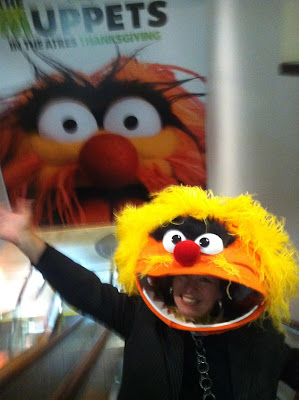Andreas Krebs, also known as Res is a political junkie who co-hosts the Toronto Puppet Explosion, one of two puppet slams happening in Toronto this June!
His background includes (as he puts it) "playing with things", crafts,
and making voices. Only recently his passions united in puppetry. He lives in Toronto, Ontario with his partner Suzanne Gallant and their cat, Panou.
 |
| (L to R) Emilie Dionne, Res, and Andy Hryhorowych, December 2010 |
M: What do you have in store for the June 6th edition of Toronto Puppet Explosion.
AK: My partner Suzanne Gallant and I are hosting.. It's going to be a fantastic show, with eight acts including ventriloquism (Tim Holland), object theatre (the Bricoteers), original musical performance (Joel Brubacher), and a couple of weird rabbit acts (Jamie Shannon and Unraku). I'm pretty fortunate to be well-connected to the puppetry community in Toronto, both through my association with Unraku (a puppetry company here) and my work as the editor of the Ontario Puppetry Association newsletter. We put the word out and pretty soon we had a really well-rounded lineup.
M: Have you performed at other slams?
AK: I've performed with Unraku at a couple of their One Night Slams. They were always a blast, Unraku comes up with some amazing and hilarious material.
M: How does what you do at the Toronto Puppet Explosion tie into the other kinds of performance you do?
AK: I'll be MCing the puppet slam as Frank Feltman, a Henson-style puppet who anchors The Krellant Evening News, a political satire web series. I'm pretty comfortable with my face in my own armpit and my arm way up in the air, so it works out.
M: How long have you been performing at Puppet Slams? AK: I've been performing at slams for a whole year! Well, a year and a bit. My first slam was performing with Unraku doing this hilarious circus act with these little yellow birds set to Khachaturian's Sabre Dance. They did all sorts of acrobatics, avian pyramids, etc. then for the finale this enormous bird came out and was vaulted off a see-saw, splattering its poor little compatriots all over the stage. I think it was conceived by Robin Polfuss. Amazing stuff.
M: Why do you think Puppet Slams are important?
AK: In my experience, live puppetry is a real niche market. To borrow an opinion from Jamie Ashby (who will be performing at the slam as part of the Bricoteers), Canadian theatre is already marginal, meaning Canadian puppet theatre is on the margins of the margins. I think puppet slams get people who might not want to pay to see an elaborate theatre piece out for some fun, introducing them to what is often experimental art, and perhaps pushing them to seek out more puppet performances.
M: Where can people contact you to perform?
AK: They can send an email to andreas@wildrun.ca. Most of my work is video, so if you're interested in commissioning a hilarious short for whatever reason, drop me a line.
M: Anything else we should know?
AK: If you're in Toronto next Wednesday June 6th, be sure to come to the Comedy Bar on Bloor at Ossington!
AK: My partner Suzanne Gallant and I are hosting.. It's going to be a fantastic show, with eight acts including ventriloquism (Tim Holland), object theatre (the Bricoteers), original musical performance (Joel Brubacher), and a couple of weird rabbit acts (Jamie Shannon and Unraku). I'm pretty fortunate to be well-connected to the puppetry community in Toronto, both through my association with Unraku (a puppetry company here) and my work as the editor of the Ontario Puppetry Association newsletter. We put the word out and pretty soon we had a really well-rounded lineup.
M: Have you performed at other slams?
AK: I've performed with Unraku at a couple of their One Night Slams. They were always a blast, Unraku comes up with some amazing and hilarious material.
M: How does what you do at the Toronto Puppet Explosion tie into the other kinds of performance you do?
AK: I'll be MCing the puppet slam as Frank Feltman, a Henson-style puppet who anchors The Krellant Evening News, a political satire web series. I'm pretty comfortable with my face in my own armpit and my arm way up in the air, so it works out.
M: How long have you been performing at Puppet Slams? AK: I've been performing at slams for a whole year! Well, a year and a bit. My first slam was performing with Unraku doing this hilarious circus act with these little yellow birds set to Khachaturian's Sabre Dance. They did all sorts of acrobatics, avian pyramids, etc. then for the finale this enormous bird came out and was vaulted off a see-saw, splattering its poor little compatriots all over the stage. I think it was conceived by Robin Polfuss. Amazing stuff.
M: Why do you think Puppet Slams are important?
AK: In my experience, live puppetry is a real niche market. To borrow an opinion from Jamie Ashby (who will be performing at the slam as part of the Bricoteers), Canadian theatre is already marginal, meaning Canadian puppet theatre is on the margins of the margins. I think puppet slams get people who might not want to pay to see an elaborate theatre piece out for some fun, introducing them to what is often experimental art, and perhaps pushing them to seek out more puppet performances.
M: Where can people contact you to perform?
AK: They can send an email to andreas@wildrun.ca. Most of my work is video, so if you're interested in commissioning a hilarious short for whatever reason, drop me a line.
M: Anything else we should know?
AK: If you're in Toronto next Wednesday June 6th, be sure to come to the Comedy Bar on Bloor at Ossington!







